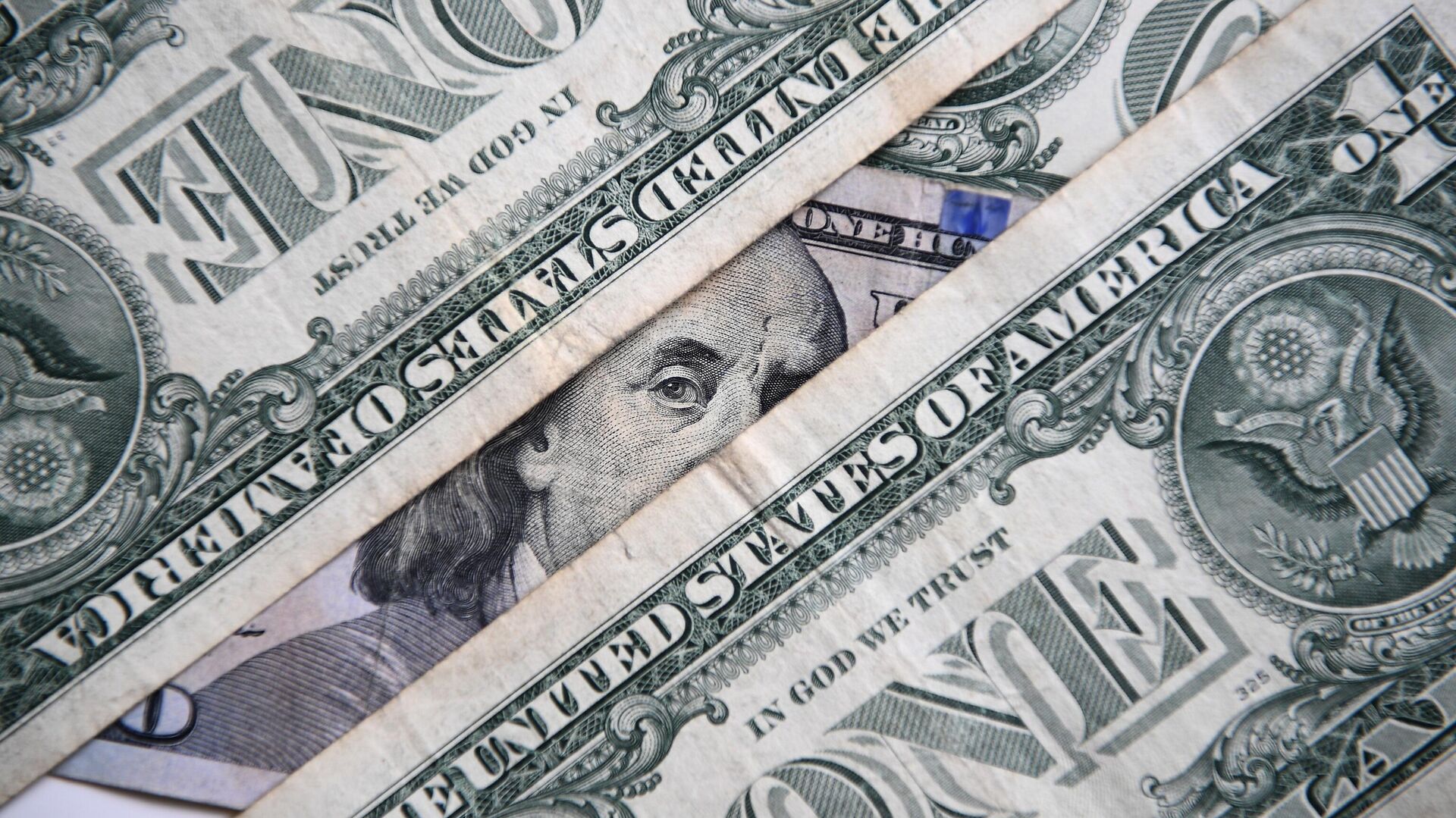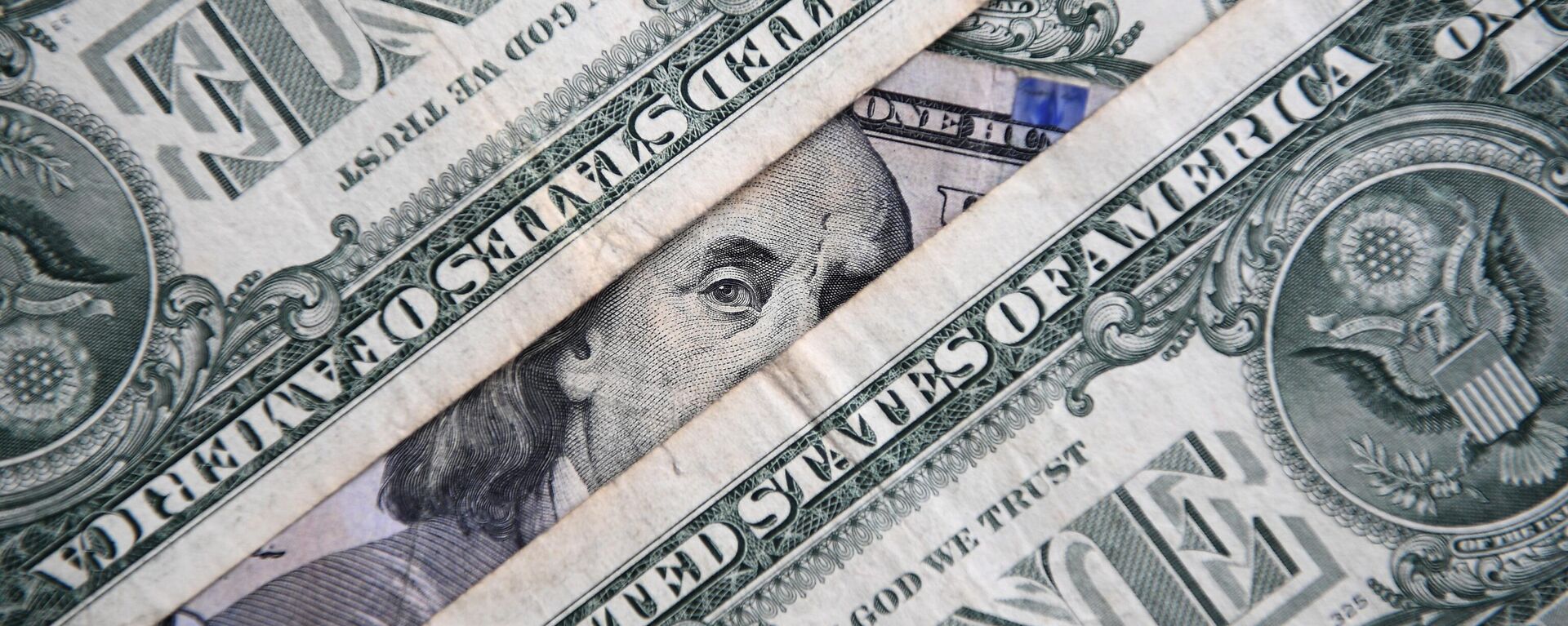https://sputnikglobe.com/20230422/dollars-reserve-power-eroded-ten-times-the-pace-seen-in-two-decades-during-2022--report-1109762043.html
Dollar’s Reserve Power Eroded ’Ten Times the Pace Seen in Two Decades’ During 2022 – Report
Dollar’s Reserve Power Eroded ’Ten Times the Pace Seen in Two Decades’ During 2022 – Report
Sputnik International
US Treasury Secretary Janet Yellen earlier said that Washington’s sanctions against Russia and other countries have put the dollar's dominance at risk because targeted nations are seeking out alternatives.
2023-04-22T14:35+0000
2023-04-22T14:35+0000
2023-04-22T14:35+0000
economy
us
russia
china
brazil
india
united arab emirates
argentina
brics
dollar
https://cdn1.img.sputnikglobe.com/img/07e6/08/0f/1099623349_0:161:3071:1888_1920x0_80_0_0_a52b2252236220ed82364d4ace1f254a.jpg
The US dollar’s status as a reserve currency eroded in 2022 at ten times the pace seen over the past two decades, according to Eurizon SLJ Asset Management.The fall comes in part due to switching to national means of payment in international settlements, they alleged.The remarks followed Treasury Secretary Janet Yellen telling a US news outlet last week that US sanctions against Russia and other countries endanger the dollar's dominance because those who were slapped with sanctions are trying to find alternatives.She spoke after French President Emamnuel Macron said in an interview that Europe should reduce its dependence on the “extraterritoriality of the US dollar."In this vein, the US news outlet singled out six “rising challenges to the greenback's dominance of international trade and investment flows.”Secondly, Malaysia kicked off talks with China to form an Asian Monetary Fund in an attempt to de-link from the dollar. "There is no reason for Malaysia to continue depending on the dollar," the country's Prime Minister Anwar Ibrahim said earlier in April, adding that Kuala Lumpur and Beijing are already in talks to use the ringgit and the yuan for trade agreements.Russia and Iran are meanwhile cooperating on the creation of a cryptocurrency backed by gold – the so-called stablecoin that could replace the dollar for payments in international trade.The two countries, which are both slapped with US sanctions, reportedly plan to issue a "token of the Persian region" for use in crossborder transactions. They look to launch “the stablecoin” in southern Russia, where Iranian shipments are already in place.Two more challenges pertain to Brazil and Argentina which recently announcing their readiness to launch a joint currency - the "sur" (south) - to help boost South American trade. The United Arab Emirates and India have likewise floated the idea of conducting non-oil trade in rupees.Russian Foreign Minister Sergey Lavrov said in this regard in February that BRIC countries are already actively working on increasing payments in national currencies in mutual trade and financial operations due to the unreliability of the dollar.“The share of national currencies in settlements between the BRICS countries is already rapidly growing. The BRICS countries have initiatives that address the need to work on the creation of their own currency. The reason is very simple: we cannot rely on mechanisms which are in the hands of those who can cheat at any time and refuse to fulfill their obligations," Lavrov told reporters.
https://sputnikglobe.com/20230331/not-by-yuan-alone-whole-set-of-national-currencies-to-deep-six-us-dollar-dominance--1109012015.html
https://sputnikglobe.com/20230413/paul-craig-roberts-washington-shot-itself-in-head-by-facilitating-de-dollarization-1109486264.html
russia
china
brazil
united arab emirates
argentina
Sputnik International
feedback@sputniknews.com
+74956456601
MIA „Rosiya Segodnya“
2023
Oleg Burunov
https://cdn1.img.sputnikglobe.com/img/07e4/09/0b/1080424846_0:0:2048:2048_100x100_80_0_0_3d7b461f8a98586fa3fe739930816aea.jpg
Oleg Burunov
https://cdn1.img.sputnikglobe.com/img/07e4/09/0b/1080424846_0:0:2048:2048_100x100_80_0_0_3d7b461f8a98586fa3fe739930816aea.jpg
News
en_EN
Sputnik International
feedback@sputniknews.com
+74956456601
MIA „Rosiya Segodnya“
Sputnik International
feedback@sputniknews.com
+74956456601
MIA „Rosiya Segodnya“
Oleg Burunov
https://cdn1.img.sputnikglobe.com/img/07e4/09/0b/1080424846_0:0:2048:2048_100x100_80_0_0_3d7b461f8a98586fa3fe739930816aea.jpg
us dollar's reserve currency status, janet yellen's warning about the risk related to the dollar's dominance, us sanctions against russia, iran. brics member states
us dollar's reserve currency status, janet yellen's warning about the risk related to the dollar's dominance, us sanctions against russia, iran. brics member states
Dollar’s Reserve Power Eroded ’Ten Times the Pace Seen in Two Decades’ During 2022 – Report
US Treasury Secretary Janet Yellen earlier admitted that Washington’s sanctions against Russia and other countries have put the dollar's dominance at risk as targeted nations seek alternatives.
The US dollar’s status as a reserve currency eroded in 2022 at ten times the pace seen over the past two decades, according to Eurizon SLJ Asset Management.
The fall comes in part due to switching to national means of payment in international settlements, they alleged.
The asset manager strategists were cited by a US media outlet as finding that the greenback's share of total global reserves fell to 47% last year, from 55% in 2021 and as much as two-thirds in 2003.
The remarks followed
Treasury Secretary Janet Yellen telling a US news outlet last week that US sanctions against Russia and other countries endanger the dollar's dominance because those who were slapped with sanctions are trying to find alternatives.
“There is a risk when we use financial sanctions that are linked to the role of the dollar that over time it could undermine the hegemony of the dollar,” Yellen said.
She spoke after French President Emamnuel Macron said in an interview that Europe should reduce its dependence on the “extraterritoriality of the US dollar."
In this vein, the US news outlet singled out six “rising challenges to the greenback's dominance of international trade and investment flows.”
According to the media, one of the main challenges is China, which looks to weaken the dollar's dominance by calling for the yuan to replace the greenback in energy deals amid Beijing’s growing trade with Moscow.
Secondly, Malaysia kicked off talks with China to form an Asian Monetary Fund in an attempt to de-link from the dollar. "There is no reason for Malaysia to continue depending on the dollar," the country's Prime Minister Anwar Ibrahim said earlier in April, adding that Kuala Lumpur and Beijing are already in talks to use the ringgit and the yuan for trade agreements.
Russia and Iran are meanwhile cooperating on the creation of a cryptocurrency backed by gold – the so-called stablecoin that could replace the dollar for payments in international trade.
The two countries, which are both slapped with
US sanctions, reportedly plan to issue a "token of the Persian region" for use in crossborder transactions. They look to launch “the stablecoin” in southern Russia, where Iranian shipments are already in place.
Two more challenges pertain to Brazil and Argentina which recently announcing their readiness to launch a joint currency - the "sur" (south) - to help boost South American trade. The United Arab Emirates and India have likewise floated the idea of conducting non-oil trade in rupees.
Last but not least, Russia and China initiated talks on developing a new reserve currency with other BRICS countries to defy the dollar's dominance. They say that the new reserve unit should be based on a basket of currencies from the group's member states, including Brazil, Russia, India, China, and South Africa.
Russian Foreign Minister Sergey Lavrov said in this regard in February that
BRIC countries are already actively working on increasing payments in national currencies in mutual trade and financial operations due to the unreliability of the dollar.
“The share of national currencies in settlements between the BRICS countries is already rapidly growing. The BRICS countries have initiatives that address the need to work on the creation of their own currency. The reason is very simple: we cannot rely on mechanisms which are in the hands of those who can cheat at any time and refuse to fulfill their obligations," Lavrov told reporters.







